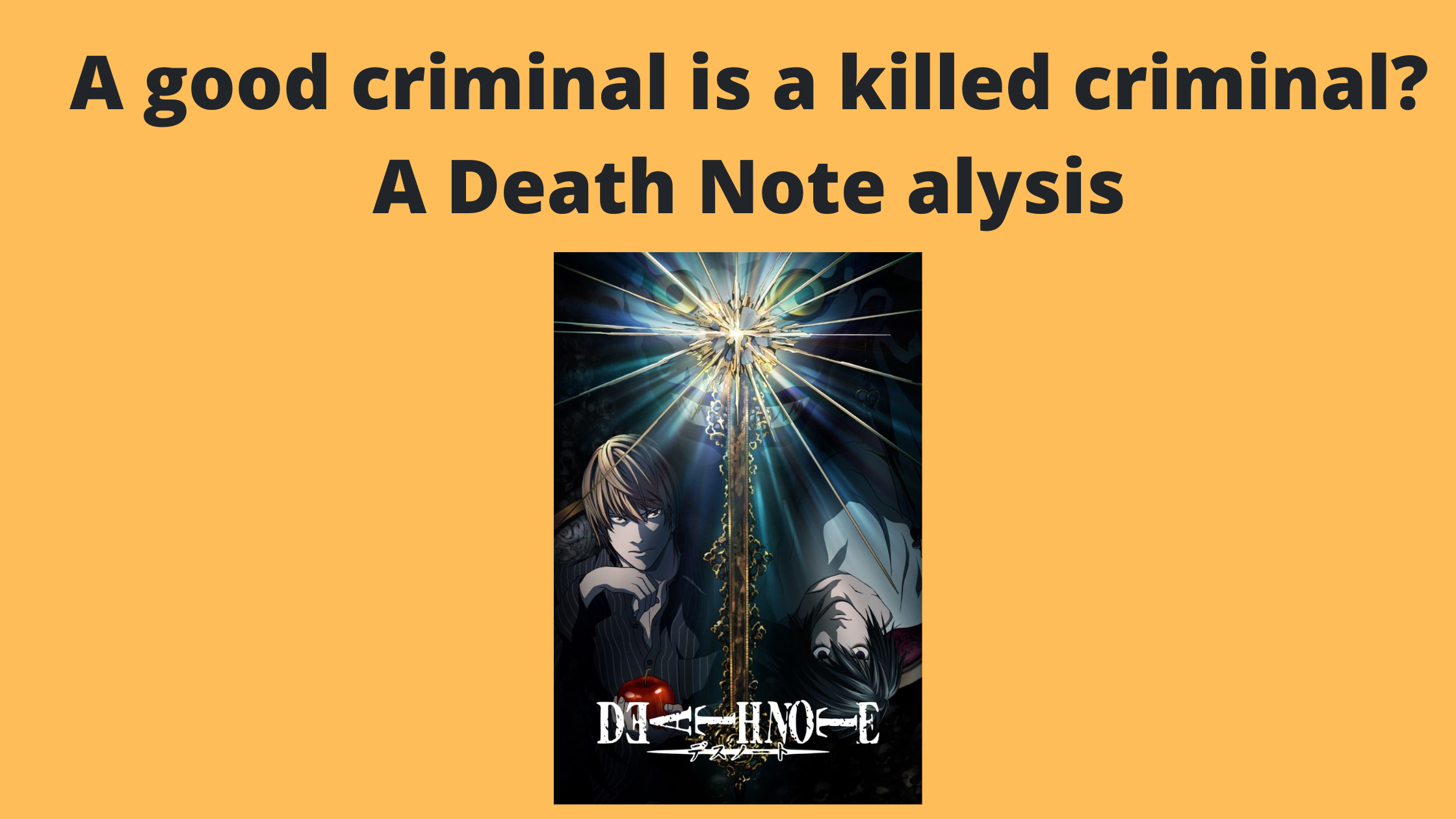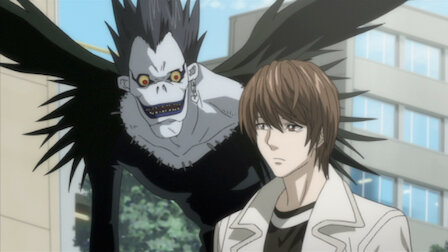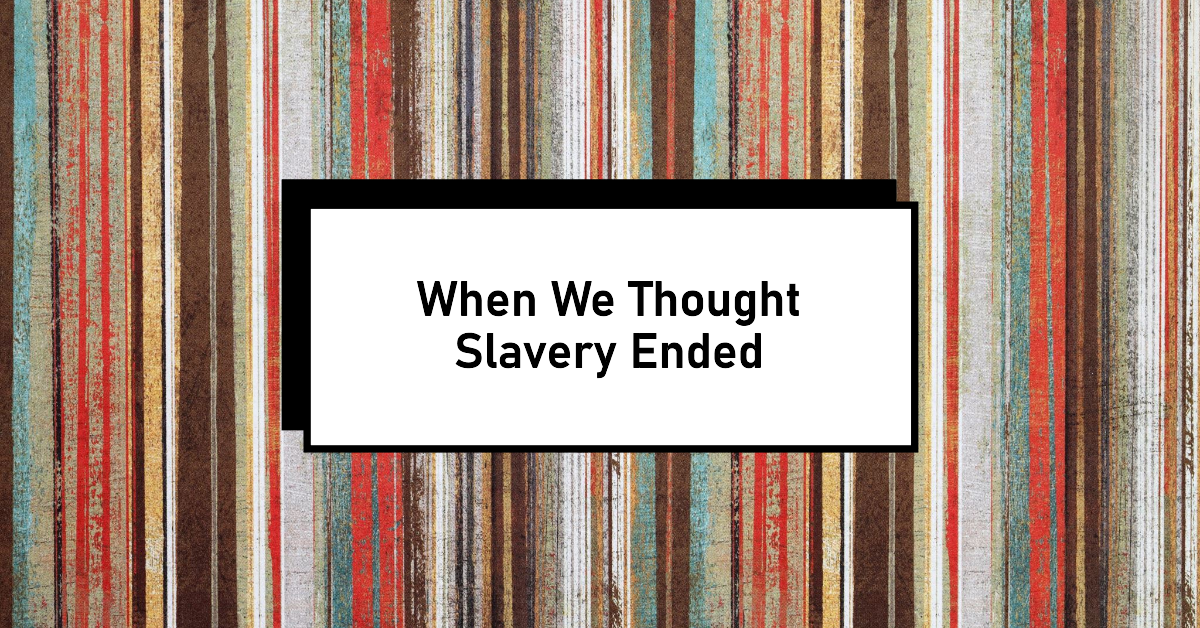A good criminal is a killed criminal? A death Note analysis

  I have been always an anime fan, mostly around my youth, and early 20s. I used to watch animes that were shown on regular TV like Saint Seya, Rurouni Kenshin, Yuyu Hakusho and Dragon Ballz, but also downloaded many animes through the internet to watch on my PC, I used to watch a diversity of different categories of animes, like horror and action in addition to drama ones. However, I stopped a bit and started to focus more on movies, since my wife started to watch with me and she didn't like them. Many people have a certain stigma that anime is an animation with kids' focus. However, those who watch them know that many types of animes aren't suitable for the under-18 audience. Not long ago I read a nice review from @intishar about Death Note. I heard before about it, more after the live-action on Netflix was released but never tried to watch it. After his review, I decided to watch and it amazed me so much that I couldn't stop one day my binge-watching. It has 37 episodes and every day I watch more than two episodes since each episode is around 20 minutes long. The premise of the anime is: "What would you do if you had a magic notebook to write down the names of people who will die?"
  Eu sempre fui um fã de anime, principalmente na minha juventude e início dos 20 anos. Costumava assistir animes que eram exibidos na TV aberta, como Saint Seya, Rurouni Kenshin, Yuyu Hakusho e Dragon Ball Z, mas também baixei muitos animes pela internet para assistir no meu computador. Assistia a uma variedade de categorias diferentes de animes, como horror e ação, além dos dramáticos. No entanto, dei uma pausa e comecei a focar mais em filmes, já que minha esposa começou a assistir comigo e não gostava de animes. Muitas pessoas têm um certo estigma de que anime é uma animação voltada para crianças. No entanto, quem os assiste sabe que muitos tipos de animes não são adequados para menores de 18 anos. Não faz muito tempo, li uma ótima resenha do @intishar sobre Death Note. Já tinha ouvido falar sobre isso, especialmente depois que a versão live-action foi lançada na Netflix, mas nunca havia tentado assistir. Após a resenha, decidi assistir, e fiquei tão impressionado que não consegui parar meu binge-watching por um dia sequer. Ele tem 37 episódios, e todos os dias assisto a mais de dois episódios, já que cada episódio tem cerca de 20 minutos de duração. A premissa do anime é: "O que você faria se tivesse um caderno mágico para escrever os nomes das pessoas que vão morrer?"

  Light Yagamani, a high school student found this notebook. The notebook belongs to a Shinigami, a type of Japanese death god. Shinigamis allow humans to possess these notebooks for their entertainment. Light is a very intelligent student who praises justice. So he decides to focus on using the notebook to kill criminals. He starts killing condemned criminals, who were already judged as guilty, but then he starts to kill people who in his point of view are considered guilty, after a few episodes he starts to kill anyone who he thinks could create some trouble for his plans, including police investigators. Light starts to get consumed by his power and he proclaims many times as a god. So I will be frank, in the beginning, you get some bonding with Light, but after a while, you get some type of repulse. I guess the creator of this anime did that on purpose. In many communities around the world, we see people in favor of the death sentence for criminals, and many extreme right parties add that to their political campaigns. Also in the anime, you see a great part of the population supporting the actions of Kira, how the population was calling Light after the newspaper named him like that (Kira is "killer" in Japanese). And I think in the real world that same thing would happen. People who live daily in violent communities don't see governments taking solutions to deal with this violence, so it is a normal feeling that could grow inside such as the only solution for crime is killing all the criminals would solve the problem. So Light got the notebook when he was young and when we are young we think that we can change the world and create a paradise. Instead of that as the anime progresses Light was mainly turning himself into a tyrant who could decide who lives or dies.
  Light Yagami, um estudante do ensino médio, encontra este caderno. O caderno pertence a um Shinigami, um tipo de deus da morte japonês. Shinigamis permitem que humanos possuam esses cadernos para sua diversão. Light é um estudante muito inteligente que exalta a justiça. Então, ele decide focar em usar o caderno para matar criminosos. Ele começa matando criminosos condenados, que já foram julgados como culpados, mas então ele começa a matar pessoas que, em sua visão, são consideradas culpadas. Após alguns episódios, ele começa a matar qualquer pessoa que ele ache que poderia criar problemas para seus planos, incluindo investigadores da polícia. Light começa a ser consumido pelo seu poder e se proclama muitas vezes como um deus. Então, serei franco, no início, você cria algum vínculo com Light, mas depois de um tempo, começa a sentir uma certa repulsa. Acredito que o criador deste anime fez isso de propósito. Em muitas comunidades ao redor do mundo, vemos pessoas a favor da pena de morte para criminosos, e muitos partidos de extrema direita incluem isso em suas campanhas políticas. Também no anime, vemos uma grande parte da população apoiando as ações de Kira, como a população passou a chamar Light após o jornal o nomear assim (Kira é "assassino" em japonês). E acredito que, no mundo real, a mesma coisa aconteceria. Pessoas que vivem diariamente em comunidades violentas não veem os governos tomando medidas para lidar com essa violência, então é um sentimento normal que poderia crescer, como se a única solução para o crime fosse matar todos os criminosos para resolver o problema. Assim, Light recebeu o caderno quando era jovem, e quando somos jovens, pensamos que podemos mudar o mundo e criar um paraíso. Em vez disso, à medida que o anime avança, Light estava se transformando principalmente em um tirano que podia decidir quem vive ou morre.

  In my point of view we can divide the anime into two eras. The "L" era and the post "L" era. What is "L"? L is the code name of the detective that was chasing Kira (or light) and is mostly the antagonist of Kira, they were mostly playing a chess game with each other to see who would catch whom. For most of his life, "L" didn't know who Kira was, and also Light didn't know what "L" real name. After 26 episodes finally Light defeats "L". At that moment we felt that the anime could finish there, but maybe because of the success the director decided to continue. But I will be frank the first 26 episodes are the best. The era post "L" continues with the successors of "L" two orphans who received the task to succeed him. Near and Mello decide to compete with each other who get Kira. Of course, at the end of the anime, it couldn't end differently for Light, as the Shinigami said when first Light got the notebook that he was going to take his life and he wasn't going to either hell or paradise. I think that the anime brought the discussions about how is dangerous to have the power to kill given to anyone even if it is to kill only criminals. The mind game between L and Light is mind-blowing. The only problem for me during the anime in addition to that it could have ended after the 26th episode, is that sometimes animes with very serious thematic still like to include dumb characters that have exaggerated emotions and screams, like the actress Misa Amane that turns out to be Light partner for most of the anime. She also finds a notebook and is a Kira fan, but she is most of the time a very naive girl with exaggerated feelings, idolatrizing Kira. But in general is one of the best animes that I have ever watched for sure.
  Na minha visão, podemos dividir o anime em duas eras. A era "L" e a era pós-"L". O que é "L"? "L" é o nome código do detetive que estava perseguindo Kira (ou Light) e é principalmente o antagonista de Kira, eles estavam basicamente jogando um jogo de xadrez para ver quem pegaria quem. Durante a maior parte de sua vida, "L" não sabia quem era Kira, e Light também não sabia o nome real de "L". Após 26 episódios, finalmente Light derrota "L". Naquele momento, sentimos que o anime poderia terminar ali, mas talvez devido ao sucesso, o diretor decidiu continuar. Mas serei franco, os primeiros 26 episódios são os melhores. A era pós-"L" continua com os sucessores de "L", dois órfãos que receberam a tarefa de sucedê-lo. Near e Mello decidem competir entre si para pegar Kira. Claro, no final do anime, não poderia terminar de outra forma para Light, como o Shinigami disse quando Light pegou o caderno pela primeira vez, que ele ia tirar a vida de Light e que ele não iria nem para o inferno nem para o paraíso. Acredito que o anime trouxe discussões sobre como é perigoso dar o poder de matar a qualquer pessoa, mesmo que seja para matar apenas criminosos. O jogo mental entre L e Light é surpreendente. O único problema para mim durante o anime, além de poder ter terminado após o 26º episódio, é que às vezes animes com temáticas muito sérias ainda gostam de incluir personagens bobos com emoções exageradas e gritos, como a atriz Misa Amane, que acaba sendo a parceira de Light na maior parte do anime. Ela também encontra um caderno e é fã de Kira, mas na maior parte do tempo é uma garota muito ingênua com sentimentos exagerados, idolatrando Kira. Mas, em geral, é um dos melhores animes que já assisti, com certeza.
Posted Using InLeo Alpha











Comments